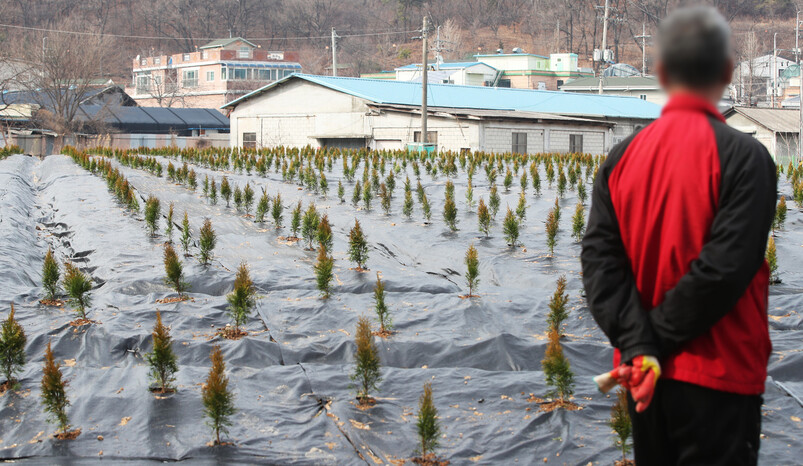Job relevance is the key to guilt
Narrow legal regulations may lead to punishment

Seedlings are planted in a field in Gwarim-dong, Siheung-si, Gyeonggi-do, in the afternoon of the 3rd, when allegations of speculation by LH employees were raised. yunhap news
As the wave of allegations of speculation by former and current employees of Korea Land and Housing Corporation (LH) in the new city of Gwangmyeong and Siheung is spreading, this case is about the speculative behavior of public officials and employees of public institutions who are likely to be exposed to development information under the current law. In fact, it is pointed out that this is the result of neglect. Like the Capital Market Act, which strictly punishes speculation by insiders using undisclosed material information, voices are high that the real estate market needs intensive revision of the law to prevent insider speculation. According to the Lawyers’ Meeting for Democratic Society and the Participation Solidarity for Democratic Society on the 3rd, the anti-corruption laws and the Special Act on Public Housing are the laws that prohibit and punish the speculative behavior of public officials and executives and employees of public institutions, such as the Ministry of Land, Infrastructure, and Transport and LH. Article 7 of the Anti-Corruption Act prohibits the use of’secrets learned during business processing’ to gain property gains, and in this case, punishment by imprisonment for not more than 7 years or fine of not more than 70 million won. The judgment of guilt pursuant to this provision is dictated by the’business relevance’, and the case of acquiring the land of a candidate site learned while designing a new city is a representative offense. The problem is that, like the LH employees, there is no direct relationship with the new city designation task. According to the Solidarity of Participation, many of the 10 LH employees who acquired the land are in charge of compensation in the metropolitan area. The Ministry of Land, Infrastructure and Transport and LH said that 13 employees had acquired 12 parcels through self-investigation on that day. “It was confirmed that they are not working in the department related to the new candidate site and the Gwangmyeong Siheung business headquarters.” In fact, it means that it was determined that there was no primary work-related relationship. The Special Public Housing Act also prohibits leakage of secrets related to the designation of public housing districts and use for other purposes in Article 9, stipulated as “security management and measures to prevent real estate speculation,” but only for the use of information learned during “business processing” for less than 5 years. Imprisonment or a fine of 50 million won or less. LH’s Code of Conduct for Executives and Employees (Article 26, Restriction on Transactions Using Job-related Information) also restricts land transactions using job-related information. Even if business relevance is recognized, there is room for claiming that the new cities of Gwangmyeong and Siheung are not’business secrets’ recognized by the Anti-Corruption Act or the Special Public Housing Act. Gwangmyeong and Siheung new cities were mentioned in the media as promising candidates in the first and second presentations related to the third new city, but they were eventually dropped. Even before it was announced as the 6th 3rd new city on the 24th of last month, it was mentioned as ‘0 priority’ in many media. Kim Tae-geun, chairman of the Minsheng Economy Committee of the Participation Solidarity (attorney), said, “If you claim that Gwangmyeong and Siheung new cities are not secrets for business, it will be difficult to punish under the current law if you say,’I only did compensation work, but I have never done the new city designation work’.” . In fact, there is no way to impose sanctions if you do not only do business related to the designation of a new city, even if you take advantage of the expertise gained from investing in a district where development is expected and working in a housing site development-related institution to earn development profits. For this reason, it is pointed out that the regulation on real estate speculation by public officials or employees of public institutions who have access to important development information such as housing site development is too lenient compared to the Capital Market Act, which punishes the use of undisclosed important information by insiders. In fact, the scope of employees recognized as insiders under the Capital Markets Act encompasses most of the employees, including’employees engaged in affairs related to finance, accounting, planning, and research and development of the corporation’ as well as undisclosed important information. It is pointed out as a problem that there is no provision for confiscation of speculative acts under the current law. While the Capital Markets Act penalizes up to five times the profits earned from violations as a fine, neither the Anti-Corruption Act nor the Special Public Housing Act provides for confiscation of profits from real estate speculation using housing site development information. Even if you are disciplined or dismissed, you can still earn speculative profits. Chairman Kim Tae-geun said, “In accordance with the Capital Market Act, it is necessary to amend the relevant law to broadly recognize the scope of insiders and establish confiscation sentences.” Choi Eun-young, head of the Korea Urban Research Institute, said, “LH and the Ministry of Land, Infrastructure and Transport are bound to be involved in various development-related tasks, but in fact, the use of development information was left to the individual’s conscience. As it does not fit, there is a need for a device to prevent speculation of public officials and employees of public institutions this time.” Meanwhile, the Ministry of Land, Infrastructure and Transport announced that it will review measures to prohibit land transactions other than residence purposes in principle, and report in advance if unavoidable, such as the Ministry of Land, Infrastructure, and LH related to the development of new housing sites. By Jin Myung-sun, staff reporter [email protected]
